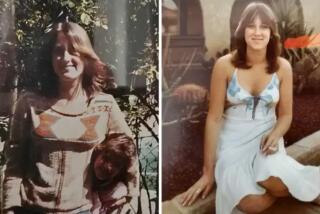DNA nets conviction in serial killings of 3 South L.A. women in ‘80s
- Share via
A 74-year-old man described by prosecutors as a serial killer who beat and choked his victims before dumping their bodies was convicted Tuesday of killing three women in South Los Angeles in the late-1980s.
Samuel Little whispered to his attorney and leaned back in his wheelchair, smiling as a courtroom clerk read the jury’s decision. After the last verdict was read, the son and a niece of one of the victims nodded their heads.
Jurors took about two hours to reach a decision after a two-week trial in which prosecutors showed photographs of the dead women, their bodies left partially clothed and abandoned amid filth and debris. Prosecutors argued that DNA found on the victims belonged to Little, who was living in Kentucky when cold-case detectives realized two years ago that they had a genetic match.
Several women, including two from Mississippi, testified that Little attacked them years before the killings. The women told jurors that Little repeatedly choked and beat them.
“He was a monster,” said Tony Zambrano, whose mother, Guadalupe Apodaca, was one of the women killed in South L.A. The 50-year-old said he was “grateful that this nightmare has ended.”
Little’s attorney, Deputy Public Defender Michael Pentz, left the courtroom Tuesday without speaking to reporters. Calls to his office were not returned.
Pentz argued during the trial that Little’s past crimes had nothing to do with whether he was responsible for the slayings of the three women.
The women — Carol Alford, 41; Audrey Nelson, 35; and Apodaca, 46 — were beaten and strangled in 1987 and 1989, their bodies found in alleyways and in abandoned garages.
Prosecutors said Little preyed on vulnerable women — those who worked as prostitutes or used drugs, and were most likely to go unnoticed or ignored by police.
Little’s crimes went far beyond South L.A., prosecutors argued. At the time of his arrest, police said they were concerned that he could be responsible for other killings across the country. Police say he committed other crimes in 24 states but never served significant time behind bars.
“He’s a serial killer, and he’s done this for years,” Deputy Dist. Atty. Beth Silverman said outside court Tuesday. “This was a verdict a long time coming.... It’s the end of an entire career of killing.”
During the trial, two women identified Little as the man who attacked them separately in Mississippi in the early 1980s. The women said they were working as prostitutes when they met Little. They said he punched and choked them. One women was beaten so badly that blood trickled from her eyes like tears, she told jurors.
Another woman testified Little attacked her in September 1984 in San Diego. She said that she had also worked as a prostitute, but not the night a man put his arm around her throat and pulled her into a dark-colored car. The woman said Little tied her up and began choking her, eventually pushing her out of the vehicle onto a heap of trash.
A month later, Little was arrested when San Diego police found an unconscious, bleeding woman in his car. He was convicted of false imprisonment and felony assault in the two attacks but was released after 2 1/2 years in prison.
Alford, his first L.A. victim, was killed shortly after his release.
After the verdicts on Tuesday, Little spoke only when L.A. County Superior Court Judge George G. Lomeli asked whether he agreed with a Sept. 25 sentencing date.
“At your discretion,” Little said.
“Well, I need an answer,” Lomeli said.
“Uhh,” Little said. “No problem.”
He faces life in prison without the possibility of parole.
Apodaca’s son was emotional as he discussed the jury’s verdict, calling Silverman and LAPD Det. Mitzi Roberts his heroes. As Roberts fielded questions from reporters, Zambrano turned to the prosecutor.
“I’m so proud of you,” he said.
Twitter: @katemather
More to Read
Sign up for Essential California
The most important California stories and recommendations in your inbox every morning.
You may occasionally receive promotional content from the Los Angeles Times.










